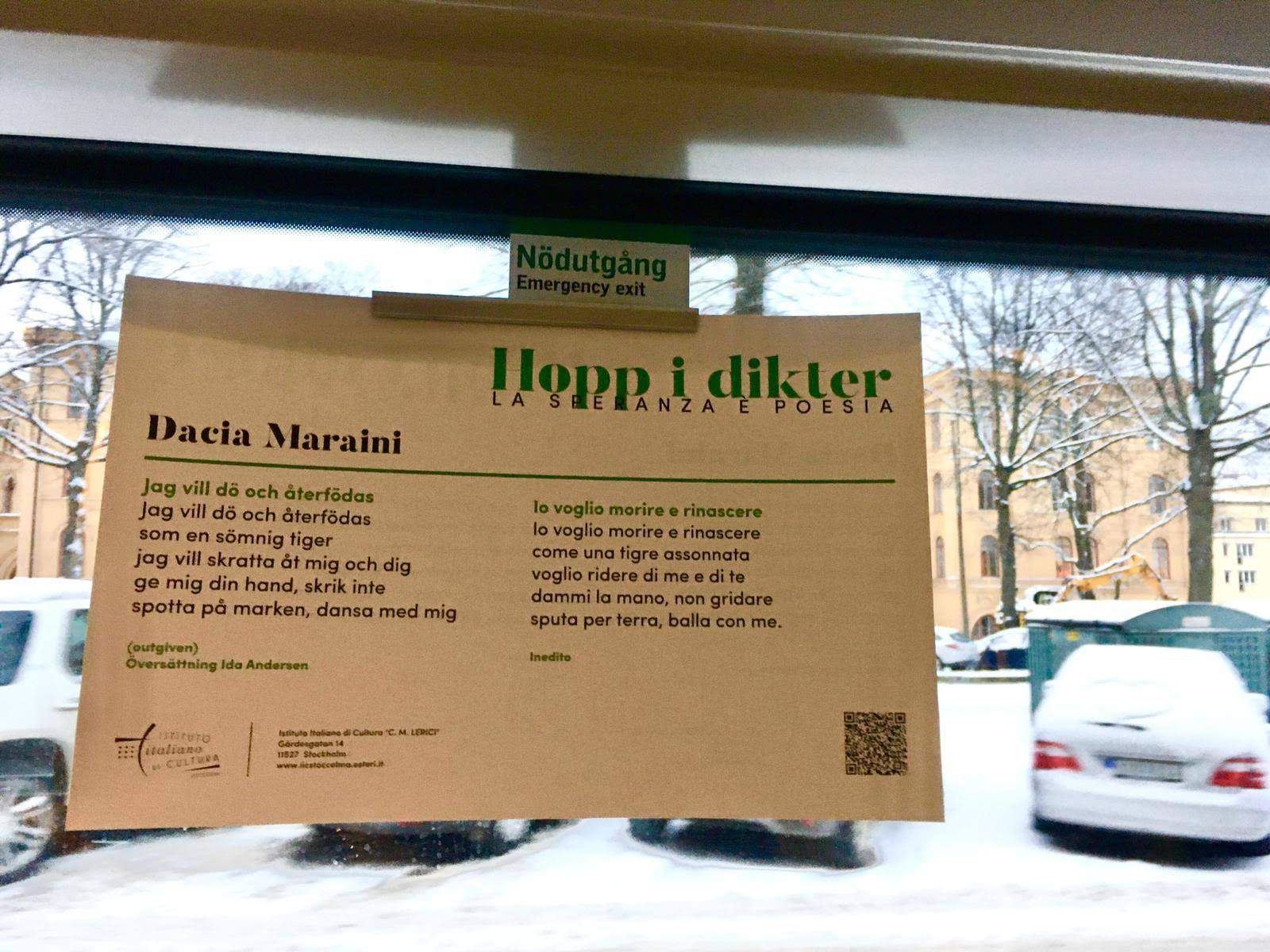Italian poetry invades Stockholm subway: verses by Pasolini and other greats
Invasion of Italian poetry in the Stockholm subway, which was filled with the verses of five Italian poets: Antonella Anedda, Valerio Magrelli, Alda Merini, Pier Paolo Pasolini and Dacia Maraini (the latter, moreover, composed an unpublished poem for the occasion). It is La speranza è poesia/Hopp i dikter, a project promoted by theItalian Cultural Institute of the capital of Sweden, which comes to life from January 18 to 31, 2021 with the intention of giving a message of hope: in fact, the goal is to convey to as many people as possible feelings of positivity and confidence in a period that is still extremely complicated and uncertain due to the Covid-19 pandemic.
The Hope is Poetry project wants to contribute to reversing the negative trend in which we have ended up, resorting to the power of words, which are able to evoke images that allow us to go beyond the semantic level of vocabulary, to enter another dimension capable of conveying serenity and confidence. The Institute’s idea is that it is important to start the year with the right attitude, cultivating hope toward the future. Thus, Hope is Poetry fits into a well-established international trend of poetry accompanying travelers. One example is Poems on the Underground born in the London Underground, in 1986, from the idea of American writer Judith Chernaik, who intended to spread poetry (both classical and contemporary) to a wider, generalist audience. The intent is to make everyday travel on public transportation more inspiring by posting a series of poems selected by Judith Chernaik herself along with poets George Szirtes and Imtiaz Dharker on London Underground cars. Poems on the Under ground has inspired similar programs in several other cities, such as Dublin, Paris, New York, Oslo, Helsinki, Warsaw, St. Petersburg and Beijing, proving to be an effective way of bringing poetry closer to even a non-specialized audience and stimulating in passengers a willingness to continue reading and learning more.
Even in Italy, there is no shortage of such examples: in 2019, during the Turin Book Fair, Salone Off hosted Metro Poetry, an initiative to bring poetry to commuters. For about two months, short poems were broadcast every hour at all Turin subway stations within the programming of Radio GTT, transforming the journey to the venues of the Turin literary event into a kind of path to the word, inviting people to listen.
The five authors of the project Hope is Poetry/Hopp i dikter, translated into Swedish, were selected because of the evocative power of their words, the Institute explains. Poems from the collection Historiae (Einaudi, 2018) were chosen for Antonella Anedda, one of the most important contemporary Italian poets, whose verses take the form of a veritable sequence of images “that bring to light what one does not want to see.” The volume was recently published in Sweden by Lyrikvännen, with translation by Ida Andersen and Nina M. Olsson.
Dacia Maraini, author of novels, essays, poems and screenplays for theater and cinema, is currently considered one of the most important Italian writers. Already in the 1960s and 1970s she was very active in the political debate on women’s rights. Very often, the protagonists of her works were women themselves, as in “Passi affrettati,” which began as a theatrical text and was recently published in Swedish under the title “Raska steg” by the Italian Cultural Institute in the CartaDitalia series, with a translation by Ida Andersen. Valerio Magrelli, poet, translator and academic, made his debut in 1980 with the collection Ora serrata retinae. The latter, published in Sweden by Ellerströms förlag in 2016 under the title “Ordets frånsida” and translated by Lars-Håkan Svensson, offers a comprehensive and perfect presentation of Magrelli’s entire poetic oeuvre to date. His poetry is characterized by a sparse and essential style, which, starting from everyday images, comes to investigate universal existential issues. Alda Merini, known to all as “the poetess of the Navigli,” having lived for most of her life on Milan’s Naviglio Grande, places at the center of her debut collection La terra santa (1980) the experience of being hospitalized in a psychiatric hospital. In the last years of her life, on the other hand, Alda Merini, now also internationally known, entered a new phase, in which her poetry moved closer to mysticism, as can be seen in the collection Francesco, canto di una creatura (2007), translated into Swedish by John Swedenmark under the title “Franciskus: den skapades sång” and published by Bokförlaget Lejd in 2019. Finally, Pier Paolo Pasolini was one of the leading figures of Italian culture in the second half of the 20th century, considered among the greatest artists and intellectuals of the 20th century. His works (from poetry in Friulian to novels, from theater to cinema) were accompanied by lucid and passionate reflection on the profound changes that characterized postwar Italy. In Swedish translation we find the anthology Olycksaliga generation, published by Smockadoll förlag in 2020 edited by Nina M. Olsson and Håkan Sandell.
Finally, on the sidelines of the Hope is Poetry project, there will also be the publication of two volumes in which the lyrics of some of Italy’s leading female poets will be collected. The first, edited by Claudio Pozzani, will be published by the Institute in spring 2021, while the second, edited by Daniela Marcheschi, will be presented in the second part of the year.
 |
| Italian poetry invades Stockholm subway: verses by Pasolini and other greats |
Warning: the translation into English of the original Italian article was created using automatic tools. We undertake to review all articles, but we do not guarantee the total absence of inaccuracies in the translation due to the program. You can find the original by clicking on the ITA button. If you find any mistake,please contact us.




























